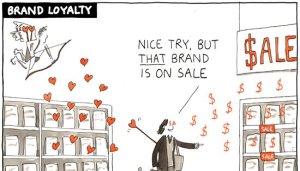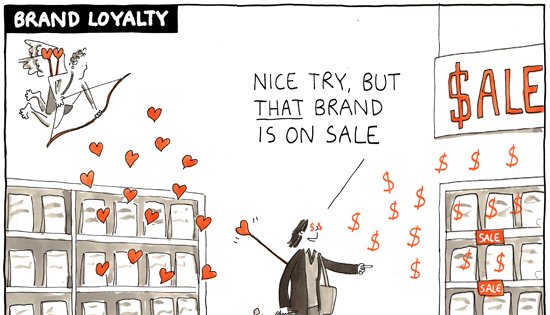
Some time ago, I was browsing the web and came across a Nielsen report titled, How Loyal Are Your Customers? The survey polled more than 29,000 people among 58 countries to evaluate consumers’ views on their level of loyalty to various products, which were broken down into sixteen categories. These categories ranged from fast-moving goods, such as bathroom staples, to technology products. Although the results were remarkable, they weren’t that surprising.
What I found most remarkable was that the respondents’ answers about loyalty to certain products seemed to correlate with what I’ve heard many people say about their marriages. I think the underlying reasons people remain loyal to a brand are the same reasons people remain loyal in their marriage. On the other hand, the reasons for leaving are also quite similar.
Do you believe there is a correlation between marriage and consumer loyalty? That people in romantic relationships cite the same reasons as customers for staying loyal? For being disloyal? It may be an idea that’s hard to digest, but I’ll ask you to keep an open mind. Who knows? You may find tips that will help you increase loyalty among your own customers – or even save your marriage!
And the Survey Says:
On average, more respondents professed to be not loyal than completely loyal to their brands. Most respondents fell somewhere in the middle range, claiming they were unlikely to switch brands or providers without a significant incentive.
While this statement is true for the respondents, it’s also typical of contemporary marriages. There are many reasons to marry someone: true love, pressure from your peers or family, prearrangement, the urge to have a child… you name it. Though, no matter how or why a marriage begins, many people become accustomed to its rhythm and get lost in the monotony. Sometimes partners feel overwhelmed or underwhelmed, like they’re not getting enough attention from their partner. They want to bring some excitement back into their lives. Sometimes, this can lead a partner to look for fulfillment elsewhere.
However, many of these apathetic individuals won’t risk the future of their marriages unless there is a significant incentive from a new beau that encourages them to leave. While they may be unhappy, they are comfortable in the relationship and may not want to undergo such a huge lifestyle change, which directly correlates to what the respondents of this survey said about the brands they use.
When it comes to business, your competitors will constantly be offering incentives to attract new customers. If you’re not taking care of your current customers, there is always a chance that they may throw themselves back in the “dating pond.”
In order to turn a fickle fan into a faithful follower, brands needs to first understand the needs and motivations that drive their purchase decisions, and then deploy the strategies and tactics that deliver the most value.
People are usually hesitant in the initial stages of a relationship, unsure of whether or not they want to commit. And, just because he put a ring on it doesn’t mean that either partner is safe from the ups and downs that are inherent in any marriage. This is true of both business and personal relationships; so when it comes to turning a hesitant partner into a loyal lover, we can all take a tip from brands that are adored by their customers.
Just as a married couple need to reassure one another that the relationship is worth it and that they’re making the right decision, brands also need to foster relationships with their customers to reassure them that they made the right decision – that the relationship is still beneficial to them.
In this case, the most notable difference between loyalty to a brand and marriage is that those in a marriage must mutually provide this reassurance, while brands are usually the only party striving to maintain loyalty in the brand-consumer relationship.
There is a direct link between the frequency of purchase and the level of loyalty to that category. For every day-use products, ongoing decision-making often changes the relationship. For example, 24% of respondents around the world claimed complete loyalty to their mobile phone brand/service provider and financial institutions. The highest loyalty percentage reported globally for any of the 16 categories measured. Conversely, the lowest levels of loyalty on a global scale (respondents said they were not loyal and likely to switch) were found with the food and beverage categories reviewed: alcoholic beverages (43%), snack brands (39%), carbonated beverages (38%) and cereal brands (37%).
I think the low levels of loyalty seen in the food and beverages category can be explained by the fact that these products are purchased frequently and quickly consumed. This means that there is a low level of commitment and that products are quickly and easily replaced. After all, there are so many choices!
Now, let’s analyze this from the perspective of marriage. If a person is the center of attention due to his or her appearance, wealth, charm, etc., that person’s options for partners will inevitably be higher. And unfortunately, a person with many options is less likely to stay loyal to his partner and may need less incentive to change.
However, mobile service providers and financial institutions saw higher amounts of loyalty. These types of businesses leave people with fewer options, yet more responsibilities and obligations, making them less likely to abandon their provider unless given significant encouragement. Have you ever felt obligated to stay with one service provider, even though you hated their plan? There are a number of reasons – for example, maybe your dream phone was much cheaper under their contract? Can you easily switch without paying penalties? Even if you wanted to switch, how many alternatives do you really have?
This is more like someone who chooses to get married because they think this person is their only hope of marriage; that their chances will decrease as they age; that it’s “just time,” whether or not they’re sure. Thus, the groundwork for many boring, unemotional, and unhealthy marriages is laid. Just as leaving a mediocre provider results in the consequences of fees, choosing to leave an unhappy marriage has consequences (children, pets, finances, etc.). This is why many people choose to stay in an unfulfilling relationship, whether it’s business or personal.
While good prices may initially offer consumers enough motivation to change allegiance to a new product, it won’t keep them for long if the product doesn’t deliver on its promise. Getting the price/value equation right, having products in stock, and offering a satisfying shopping experience are vital ways to build long-lasting customer loyalty.
As any decent marketer knows, it takes more resources to gain a new customer than it does to keep current ones happy and loyal. You need to spend money to build awareness for your service or product, come up with creative ways to present it to potential customers, and give away freebies to get them to try it. Needless to say, these efforts require a significant amount of time, budget, and effort. The worst part of this whole deal is that there is no guarantee that the people taking your freebies will actually become a regular customer. They can even engage with you on social media, click on your ads, enjoy the freebie, and wind up using your competitor’s product or service.
This is reminiscent of marriages. You can convince someone to get married to you, but it is up to both parties to keep the marriage happy and healthy. You spend so much time, money and effort building a strong relationship with the person you marry (not to mention paying for a wedding), but what is the point of courting them and convincing them to marry you if you do not invest in your relationship once the ceremony is over?
When a couple chooses to get married, each person has a certain expectation of how the relationship will grow in terms of affection, understanding, trust, and loyalty. When it comes to business and the advent of social media, people now expect to have a deeper connection to the brands they use everyday. To succeed, your strategies must look beyond the dollar. You need to create value and build relationships with your customers.
So What Do We Really Mean By Loyalty?
I believe, based on my findings, there is a direct correlation between brand loyalty and the choices made within a relationship.
However, I would still love to hear your opinions on the following questions that have been taking over my mind for the past few days. If a customer who has been using one particular brand for a number of years decides to switch for sensible reasons, does it mean they were never loyal to the old brand? Should the company just write him off or should we consider what changed the relationship? Is it right to blame the customer without questioning ourselves? Is it too late to change their mind? Are these same questions asked in marriages that are on the decline? Do we curse someone for exploring their options, or do we take the time for introspection or reflection while wondering what we could have done differently?
Thoughts?




